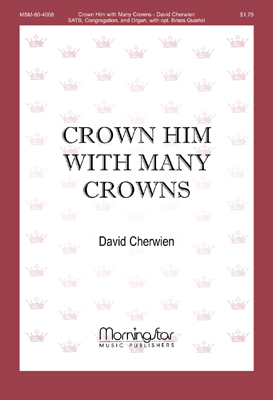- |
User Links
Crown Him with Many Crowns
Hymn Information
- First Line
- Crown him with many crowns
- Author (sts. 1, 3, 4)
- Matthew Bridge (1851)
- Author (st. 2)
- Godfrey Thring (1874, alt.)
- Tune Name
- DIADEMATA
- Composer
- George J. Elvey (1868)
- Topic
- Church Year: Easter/Season of Easter · Church Year: Ascension · Church Year: Christ the King · Jesus Christ: Atonement · Jesus Christ: King · Jesus Christ: Lamb · Jesus Christ: Lamb · Jesus Christ: Lord · Jesus Christ: Redeemer · Jesus Christ: Reign
Copyright Information
- Text Copyright
- Public Domain
- Tune Copyright
- Public Domain
- Reprint/Projection Information
- Words and Music: The Words and Music are in the Public Domain; you do not need permission to project or reprint the Words and Music.
Full Text
Scripture References
Thematically related:
- st. 1 =
- st. 3 = ·
Further Reflections on Scripture References
The text is a magnificent celebration of Christ's victory over sin and death and of his rule in the world. The "crown," which in Revelation refers to both the crown of royalty/ kingship and the wreath of victory given to an athlete, symbolizes both the victory and the rule.
Psalter Hymnal Handbook
Confessions and Statements of Faith References
Further Reflections on Confessions and Statements of Faith References
The confessions make it clear that the ascension of Christ opened the door to the rule of his kingdom. This fact is comforting to those who love him and is a fearful threat to those who despise him. The response therefore is praise and adoration from people of faith, and resistance from those who reject him.
Our World Belongs to God, paragraph 27 affirms “All authority, glory and sovereign power are given to him,” and reaffirms it in paragraph 43: “Jesus Christ rules over all.”
Consider the clear affirmation made in Heidelberg Catechism, Lord’s Day 19, Question and Answer 50: “Christ ascended to heaven to show there that he is the head of his church, the one through whom the Father rules all things.”
It is no wonder that those who despise him join together to conspire against him, for Christ’s aim as Lord is to “destroy the devil’s work…every force which revolts against you and every conspiracy against your holy word” (Heidelberg Catechism, Lord’s Day 48, Question and Answer 123).
Crown Him with Many Crowns
Call to Worship
Words of Praise
Assurance
Blessing/Benediction
Additional Prayers
Crown Him with Many Crowns
Tune Information
- Name
- DIADEMATA
- Key
- D Major
- Meter
- 6.6.8.6. D


 My Starred Hymns
My Starred Hymns






